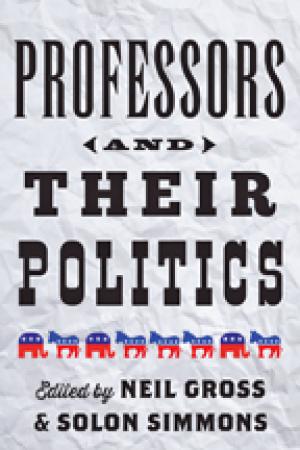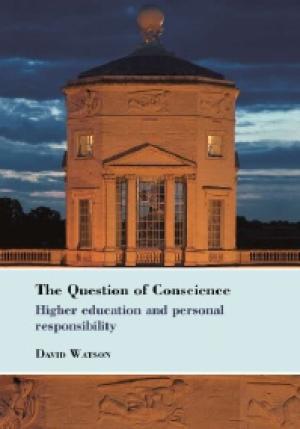Resources

Click Here for Book Review Abstract: Professors and Their Politics tackles the assumption that universities are ivory towers of radicalism with the potential to corrupt conservative youth. Neil Gross and Solon Simmons gather the work of leading sociologists, historians, and other researchers interested in the relationship between politics and higher education to present evidence to the contrary. In eleven meaty chapters, contributors describe the political makeup of American academia today, consider the causes of its liberal tilt, discuss the college experience for politically conservative students, and delve into historical debates about professorial politics. Offering readable, rigorous analyses rather than polemics, Professors and Their Politics yields important new insights into the nature of higher education institutions while challenging dogmas of both the left and the right. (From the Publisher)

Click Here for Book Review Abstract: Most of the claims about the purposes and achievements of higher education are irreducibly individualistic: it will change your life, through conversion or confirmation of faith, by improving your character, by giving you marketable “abilities,” by making you a better member of the community, or by being simply “capable” of operating more effectively in the contemporary world. All of these qualities scale up, of course, but in differing ways. David Watson explores the question of what higher education sets out to do for students through a number of lenses, including the “evolutionary” stages of modern university history, the sense participants and observers try to make of them, and a collection of “purposes,” or intended personal transformations. The resulting combinations are clustered around major questions about the role of universities for their students, and in society at large. He concludes by testing claims about the role of higher education in developing varieties of personal responsibility. The Question of Conscience identifies and explores how varied these claims have been over the long history of the higher enterprise, but also how strong and determined they invariably are. (From the Publisher)

Click Here for Book Review Abstract: Rethinking Knowledge within Higher Education argues for a higher education that is neither a romantic idyll of learning for its own sake nor an instrumental institution designed to train a willing workforce for the prevailing economic system. Instead, using analysis informed by critical theorist Theodor Adorno, this book argues that higher education should have social and economic roles at its heart, and that these should encompass the needs of all society. The key to achieving this purpose without privilege lies in the ways in which knowledge is understood and engaged with in higher education. Higher education has a special role in society as a place in which complex, contested and dynamic knowledge is engaged with, challenged and created. The realization of this purpose challenges traditional dichotomies between economic and social purposes, liberal and vocational education, and theory and practice. Jan McArthur shows that by interpreting and adapting some of Adorno's most complex ideas, the nature of knowledge and the pursuit of social justice within higher education is feasible and aspirational. (From the Publisher)

For many, the academy has historically represented privilege and intellectual exclusion; for others it has represented an increasingly contested site, as marginalized populations have challenged the myth of the ivory tower being a haven of meritocracy and equal opportunities. Still others persist in viewing universities as a level playing field, a place where people are judged primarily by their ideas and intellectual contributions. Ironically, alongside these charged conversations of exclusivity, privilege, and opportunity has occurred the seduction of the ivory tower by market interests, sacrificing standards in the interests of ill-defined efficiency. Much has been written on the increasingly market-driven culture of higher education; many have called this commodification and instrumentalization the most dangerous ideology of the current historical moment. Yet, within this landscape, there have been scholars willing to make space to critically interrogate higher education in relation to multiple systems of oppression. They are working to introduce new perspectives, nurturing counter-hegemonic knowledges. Many have struggled to cocreate and sustain democratic spheres that decenter dominant interests, with the aim of a more equitable society. They have been part of a larger movement of academic warriors, academics with consciences who live out their commitments by subscribing to the notion that scholarship and activism are inextricably intertwined. This volume embodies their narratives and issues an open invitation.‚Ä® This is 139th volume of this Jossey-Bass quarterly report series. Noted for its depth of coverage, it explores issues of common interest to instructors, administrators, counselors, and policymakers in a broad range of adult and continuing education settings, such as colleges and universities, extension programs, businesses, libraries, and museums. (From the Publisher)
This "roundtable" collection of articles discusses the notion of renunciation in relation to an experiment in which a college class had the option to renounce the right to learn about their grades during the course. Topics include the history of grading in university and college courses, the problem of plagiarism, and the role of evaluation in higher education. Responses by Kimberly Rae Connor, Michael Desjardins Yasaman Samiksa Munro, Tina Pippin, and Ken Derry

Click Here for Book Review Abstract: Neoliberalism’s War on Higher Education reveals how neoliberal policies, practices, and modes of material and symbolic violence have radically reshaped the mission and practice of higher education, short-changing a generation of young people. Giroux exposes the corporate forces at play and charts a clear-minded and inspired course of action out of the shadows of market-driven education policy. Championing the youth around the globe who have dared to resist the bartering of their future, he calls upon public intellectuals—as well as all people concer ned about the future of democracy—to speak out and defend the university as a site of critical learning and democratic promise. (From the Publisher)
Harvard deans argue it’s time to reimagine higher education’s civic mission. The public purposes of education should go beyond benefits to individuals and focus on a tripod of intellect, morality, and action, all grounded in a knowledge base of American history and constitutional principles.
Perhaps the most dramatic shift in library services is the transition from a purely physical to a physical/virtual environment. This article examines how 21stC online librarians deliver reference services to students and faculty, and explores the ramifications future librarians’ education, including areas of technology, instruction, interpersonal skills, intellectual property.
Article addresses: what are some of the drawbacks to taking a human rights approach to information rights?
Religious studies suffers from the outside threat of less and less funding like all the humanities and from the inside challenge that religious studies is simply an ideology. Schneider argues that the religious studies major "needs to grow up" and learn to articulate what it is good for. He articulates several of these goods.